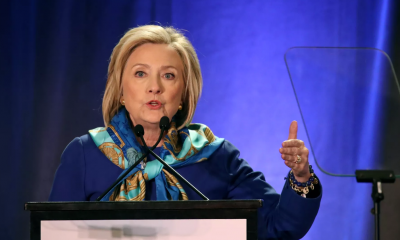World
Hillary Clinton to hand over private email server

Washington: Democratic presidential candidate Hillary Clinton has already instructed her attorney to hand over her private email server and a thumb drive containing all her work-related emails to the Justice Department to quell controversy surrounding her otherwise smooth slide to the Democratic nomination, the media reported.
Quoting Clinton’s spokesman Nick Merrill, CNN reported that the undisputable Democratic presidential front-runner has “directed her team to give her email server” which was exclusively during her years as the top US diplomat, to Justice Department as well as a thumb drive with all her work-related emails.
For months, Republican rivals, including House speaker John Boehner, had called for the Clinton camp to hand over to authorities her private email server but to little avail, and the voluntary handing over by the Clinton camp this time indicated the Clinton camp’s increasing concern that the issue could further dent Clinton’s trustworthiness.
Though starting with a strong momentum, favorability rating for Clinton dipped recently as the former Secretary of State was grappling with negative news coverage, including her controversial practice of exclusively using personal email account and server while working as the US top diplomat.
According to the latest Quinnipiac poll released on July 30, 57 percent of voters regarded Clinton as not honest and trustworthy. Other national polls also indicated that an increasing number of Americans see Clinton as not honest as the leader of the country.
World
Lockdowns in China Force Urban Communities to Defy Censorship and Vent Frustration Online

Shanghai’s rich middle class is leading a wave of online dissent over the strict and prolonged lockdowns imposed in various parts of the country. Chinese internet censorship is struggling as patience is wearing thin in many urban centers, coming up with creative forms of online protests.
Social Media Posts Revealing Lockdown Tension in Shanghai
Drawn-out lockdowns are nothing new in China as authorities insist with the nation’s zero-Covid policy since the start of the pandemic. Currently over This time around, however, metropolitan areas like Shanghai are increasingly difficult to keep quiet, given that its more than 25 million residents have seen weeks of total isolation along with food shortages and many other service interruptions.
Dozens of towns and reportedly over 300 million Chinese citizens have been affected by lockdowns of different severity. As expected, urban netizens have been most outspoken over their difficulties by finding creative ways to get around state censorship and bans placed on topics, news comments and spontaneous campaigns.
Shanghai residents have been using mobile proxies and hijacking seemingly unrelated hashtags to talk about healthcare issues, delivery failures and the overall severity of their situation. The “positive energy” that the Chinese government wants to transmit during the recent prolonged series of lockdowns does not come naturally to those counting food supplies and online censors are working hard to filter words, trending topics and undesired social media sharing.
WeChat groups and message threads are under constant monitoring. Posts questioning the zero-Covid approach have been quickly deleted, including by leading Chinese health experts like Dr. Zhong Nanshan. Video footage is soon censored and protests and investigations are quickly made to disappear.
Where this has not worked, officials have exposed banners with warnings and outright threats like “watch your own mouth or face punishment”, while drones have been patrolling the city skies. Yet, if anything, this has led to further tensions and unspoken confrontation with Shanghai’s educated and affluent middle class.
Creative Online Solutions Harnessing Civic Energy
Announcements by Chinese social media that they would be publishing the IP addresses of users who “spread rumors” have not helped either. Tech industry research has shown that much of Asia’s tech-savvy population has a habit of using mobile proxies and other privacy tools, quickly finding workarounds to browse the internet freely and talk to the world about the hottest topics.
The sheer volume of forbidden posts is already a challenge for the very censorship system, experts explain. Unable to track all trending hashtags, state workers overlook topics that speak about the US, Ukraine or other popular news. Linking human rights elsewhere to their situation, Chinese online dissidents establish their informal channels and “hijack” the conversation to share personal or publicly relevant information about the Covid suppression in their town.
Sarcastic and satirical posts still dominate. Others hope to evade the censors by replacing words from famous poems or the national anthem. One thing is certain – social media, when harnessed with the right creativity, has proven its ability to mount pressure on the government in even some of the most strictly controlled tech environments like China.























